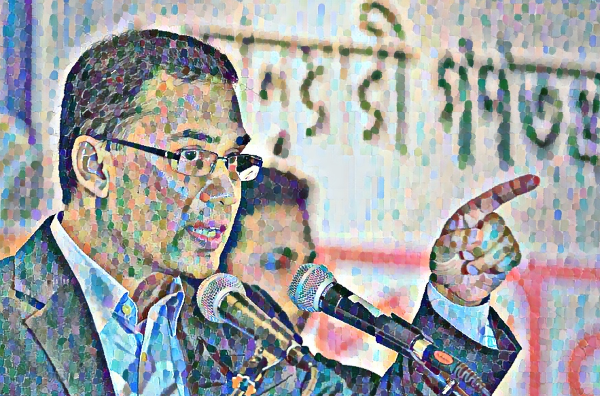In a nation overloaded with adjectives, Tarique Rahman’s approach brings a refreshing change

In Bangladesh’s democratic theater, there’s an enduring tradition: a political leader’s worth often seems measured by the length and grandeur of their title.
If your leader doesn’t boast an adjective longer than their résumé, they may not even be worth the banner you painstakingly printed.
Phrases like “Rajpather Loraku Shoinik” (The Warrior of the Streets), “Bar Bar Nirjatito Neta” (Repeatedly Persecuted Leader), and “Somoyer Sahoshi Sontan” (Brave Son of the Times) are staples in our lexicon of political adoration.
There’s a peculiar, almost perverse, satisfaction in hearing someone with a questionable track record hailed as “The Beacon of Light” or “The Savior of the Oppressed.”
For a masterclass in this art of verbal aggrandizement, we can turn to Tajikistan, where President Emomali Rahmon has set an unparalleled standard.
News anchors there must perfect a tongue-twisting recital every time they mention him: “The Founder of Peace and National Unity, Leader of the Nation, President of the Republic of Tajikistan, His Excellency Emomali Rahmon.”
Survive that in one breath, and you might have a future in public relations.
Back in Bangladesh, while we haven’t institutionalized such elaborate eulogies, we’ve embraced the spirit wholeheartedly.
Bestowing grand titles on political figures has become almost a cultural rite. Whether these leaders have actually delivered on their promises is a footnote often left unwritten—the adjectives usually drain our ink before we get there.
Amid this spectacle of glorification steps Tarique Rahman, Acting Chairman of the Bangladesh Nationalist Party (BNP).
In a move that sent ripples through political circles, he recently broke tradition by requesting party members to refrain from using grand titles like Deshnayak (Leader of the Nation) and Rashtranayak (National Leader) before his name.
But that wasn’t all—he also issued a strict ban on organized birthday celebrations in his honor. No cakes, no confetti, and, crucially, no fund collections masquerading as party loyalty.

Why Tarique’s attempt is very
unique
Tarique’s gesture stands out in a political landscape addicted to theatrics. Whether this move marks a genuine shift or is just another chapter in Bangladesh’s political drama remains to be seen.
But for now, it’s a rare break from the tradition of drowning in a sea of adjectives.
For a moment, it felt like a glitch in the matrix—a Bangladeshi political leader rejecting adoration?
No grandiose titles, no lavish birthday celebrations? Such radical modesty seemed almost unthinkable.
Yet, Tarique Rahman’s message was unmistakable: leadership should be about accountability, not adulation.
By turning away from the tradition of excessive glorification, he not only disrupted a deeply ingrained culture of sycophancy but also set a new benchmark for political leadership in Bangladesh.
This move isn’t just about avoiding flowery language—it reflects a deeper cultural shift.
For decades, political leaders in Bangladesh and many other developing nations have relied on theatrics to obscure their failures.
Their demands for loyalty often rest on a manufactured “divine right” to lead, bolstered by historical embellishments and a flurry of poetic titles.
In stark contrast, since taking the helm of the BNP in 2018, Tarique Rahman’s leadership has emphasized accountability, discipline, and reform.
Under his watch, the party has taken a strong stance against corruption and misconduct, expelling members accused of unethical practices—an uncommon approach in a political culture often riddled with impunity.
Moreover, the BNP, under his directives, has extended financial support to grassroots members and activists affected by political violence or state repression, demonstrating genuine care for its rank and file while revitalizing morale.

The unique traits of
Tarique’s leadership
Tarique has also championed political reform, pushing for accountability through transparent governance and substantive programs.
His leadership style is strategic and focused, as seen in the BNP’s agenda-driven standing committee meetings and robust grassroots mobilization efforts.
This stands in stark contrast to the autocratic tendencies that dominate many political organizations in the region.
Most strikingly, Tarique’s decision to forgo grandiose titles and shun unnecessary celebrations reflects a humility rarely seen in Bangladesh’s political arena.
It signals a commitment to shifting the narrative from theatrics to meaningful leadership—a bold step that challenges the status quo and redefines what it means to lead in a landscape steeped in excess and spectacle.
Meanwhile, in the broader political landscape, the epidemic of grandiose adjectives remains alive and well.
Across South Asia, leaders are often exalted as if they’ve single-handedly eradicated poverty, cured diseases, and ushered in global harmony—all claims far removed from reality.
In Bangladesh, we’ve seen our fair share of “unmatched visionaries” whose actual contributions fall laughably short of their self-bestowed titles.
This isn’t unique to Bangladesh. From Emomali Rahmon in Tajikistan to the late Nursultan Nazarbayev of Kazakhstan, the practice of elevating leaders to near-mythical status is deeply ingrained in many third-world political cultures.
These grand displays often serve as a smokescreen, diverting attention from pressing issues such as unemployment, corruption, and inadequate public services.
Tarique Rahman’s approach offers a refreshing counterpoint—not just for Bangladesh but for political leaders worldwide.
Leadership isn’t defined by the number of banners that display your face or the adjectives that precede your name; it’s about meaningful actions that improve the lives of ordinary people.

End of an era of empty
titles?
Tarique’s decision to forgo birthday celebrations is more than a symbolic gesture—it’s a repudiation of the transactional politics often tied to such events.
In many cases, leaders use birthdays as an opportunity to mobilize supporters, solicit donations, and reinforce a cult of personality.
By banning these practices, Tarique Rahman has drawn a clear distinction between authentic leadership and self-serving theatrics.
For the citizens of Bangladesh, this change in tone offers a glimmer of hope. Perhaps it signals the beginning of a shift away from an era of hollow slogans and superficial grandstanding toward one of genuine governance. Adjectives won’t fix crumbling roads, lower commodity prices, or enhance education systems. But leaders who prioritize humility, accountability, and action just might.
To the rest of the political class, the message is unmistakable: the era of empty titles is drawing to a close.
The people of Bangladesh are weary of grandiose promises that yield little action. Leaders like Tarique Rahman are proving that humility and dedication can resonate far more deeply than the most elaborate titles ever could.
As Bangladesh navigates this pivotal political transition, it’s time for our leaders to take a cue from Tarique Rahman’s example.
Let’s leave behind the parade of adjectives and shift our focus to meaningful actions that embody true leadership. Theatrics have had their day; now begins the era of accountability.
For those still clinging to their Rajpather Loraku Shoinik banners, consider this a reality check: the people of Bangladesh deserve more than your lofty words.
They deserve leaders who follow through on their promises. Because, ultimately, no amount of flowery eulogies can mask the cracks in a failing system.
—-
H. M. Nazmul Alam is an Eminent Academic, Journalist, and Political Analyst.

